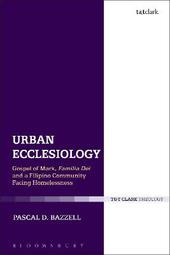
|
Urban Ecclesiology: Gospel of Mark, Familia Dei and a Filipino Community Facing Homelessness
Hardback
Main Details
| Title |
Urban Ecclesiology: Gospel of Mark, Familia Dei and a Filipino Community Facing Homelessness
|
| Authors and Contributors |
By (author) Pascal D. Bazzell
|
| Series | Ecclesiological Investigations |
|---|
| Physical Properties |
| Format:Hardback | | Pages:272 | | Dimensions(mm): Height 234,Width 156 |
|
| Category/Genre | Christian theology
Christian institutions and organizations |
|---|
| ISBN/Barcode |
9780567659804
|
| Classifications | Dewey:262 |
|---|
| Audience | | Tertiary Education (US: College) | |
|---|
| Illustrations |
1 Maps
|
|
Publishing Details |
| Publisher |
Bloomsbury Publishing PLC
|
| Imprint |
T.& T.Clark Ltd
|
| Publication Date |
21 May 2015 |
| Publication Country |
United Kingdom
|
Description
Pascal D. Bazzell brings the marginal ecclesiology of a Filipino ecclesial community facing homelessness (FECH) into contemporary ecclesiological conversation in order to deepen the ecumenical understanding of today's ecclesial reality. He contributes relevant data to support a theory of an ecclesial-oriented paradigm that fosters ecclesial communities within homeless populations. There is an extensive dialogue occurring between ecclesiologies, church planting theories or urban missions and the urban poor. Yet the situation with the homeless population is almost entirely overlooked. The majority of urban mission textbooks do not acknowledge an ecclesial-oriented state of being and suggest that the street-level environment is a place where no discipleship can occur and no church should exist. By presenting the FECH's case study Bazzell emphasizes that it is possible to live on the streets and to grow in the faith of God as an ecclesial community. To be able to describe the FECH's ecclesial narrative, Bazzell develops a local ecclesiological methodology that aims to bridge the gap between more traditional systematic and theoretical (ideal) ecclesiology and practical oriented ecclesiology (e.g. congregational studies) in order to hold together theological and social understandings of the church in its local reality. He articulates a theological framework for the FECH to reflect on who they are (the essence of identity studies), who they are in relationship to God (the essence of theological studies), and what that means for believers in that community as they relate to God and to each other in ways that are true to who they are and to who God intends them to be (the essence of ecclesial studies). The research provides a seldom-heard empirical tour into the FECH's social world and communal identity. The theological findings from the FECH's hermeneutical work on the Gospel of Mark reveal an understanding of church being developed as gathering around Jesus that creates a space for God's presence to be embodied in their ordinary relationships and activities and to invite others to participate in that gathering. Moreover, it addresses ecclesial issues of the supernatural world; honor/shame values; and further develop the neglected image of the familia Dei in classical ecclesiology that encapsulates well the FECH's nature, mission and place.
Author Biography
Pascal D. Bazzell, MA., MDiv., PhD., an OMF International member, is currently a Swiss National Science Postdoc Fellow at the Humboldt-University of Berlin, Germany. Originally from Switzerland, he served in the Philippines from 1998 - 2014 in church planting, community development and as a professor of intercultural theology in addition to being the missiology and religious studies department head at Koinonia Theological Seminary Foundation, Inc.. He has ministered for 10 years to various street-level communities in Davao City, Philippines with his wife Karina F. Ravello Bazzell and their three children.
ReviewsHow can the Church be a community of love and justice to migrants who live in cities, often as homeless? This challenging question is addressed, with bold imagination and theological depth, by Pascal D. Bazzell. On the basis of biblical teaching and the best contemporary theology of mission Bazzell puts forth an "embodied ecclesiology" in which the church functions as familia Dei, an image appealing not only to Filipinos but also to all who work with and for the poor. I most strongly recommend this book for pastors and theologians alike. * Peter Phan, Georgetown University, USA * Pascal Bazzell's study of the ecclesiology of a homeless community is exemplary of how a local theology is to be done. He provides not only insight into a specific community's faith, but also raises important questions about what it means to belong to Christ for the larger church today. * Robert Schreiter, Catholic Theological Union, USA * What does it mean to be church in a community facing homelessness in Filipino society? This fascinating study by Pascal Bazzell draws on Scripture, theological sources and ethnographic studies, to demonstrate that even the homeless experience an ecclesial life. One can only agree that, in the author's own words, "in the midst of many different forms of grave suffering, injustice and oppression, something pure, holy and sacred is being born on the streets of Filipino society. * Neil Ormerod, Australian Catholic University, Australia * That this book appears in Bloomsbury's Ecclesiological Investigations series both marks important developments in contemporary thinking about the church and signals the opportunities and challenges of theology as an ever-increasingly interdisciplinary field of inquiry. On the one hand, ecclesiologists will be treated to a vision of the ekklesia that is robustly empirical in its methodology, equally reappropriative (of historical formulations) and creative (in looking ahead to the nature and being of the church in the twenty-first century) in its theological formulation, and concretely local and suitably global in its scope. On the other hand, the multi-disciplinary nature and missiological thrust of the discussion stretches the boundaries of approaches and trajectories of investigation typical in much of this series, if not also vis-a`-vis the main lines of ecclesiological reflection up to the present time. * From the Foreword by Amos Yong *
|